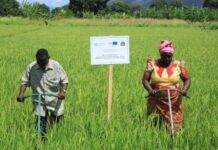The UN agencies; The Food and Agriculture Organization of the United Nations (FAO), the United Nations World Food Programme (WFP) and UNICEF are calling for urgent action to address the dramatic acute food insecurity in northern Ethiopia.
The call came in response to the latest Integrated Food Security Phase Classification (IPC) analysis, released today. The IPC is a global, multi-partner initiative – comprised of 15 UN agencies, regional organisations, and international non-governmental organisations – that facilitates improved decision-making through the provision of consensus-based food insecurity and malnutrition analysis.
The three agencies are particularly concerned about the situation in Tigray region where the risk of famine is imminent, unless food, livelihood assistance and other life-saving interventions continue to be scaled-up, unimpeded access is guaranteed, and hostilities cease.
Acute food insecurity
According to the report, over 350 000 people are already facing catastrophic conditions (IPC 5, Catastrophe) in Tigray region. This is the highest number of people classified in IPC 5 Catastrophe in a single country in the last decade. Over 60% of the population, more than 5.5 million people, grapple with high levels of acute food insecurity (IPC 3-5) in Tigray and the neighbouring zones of Amhara and Afar. Of these, 2 million people are in Emergency level of acute food insecurity (IPC 4) and without urgent action could quickly slide into starvation.
The severity of acute food insecurity is expected to increase through September, particularly in Tigray, with over 400 000 people projected to face catastrophic conditions (IPC 5, Catastrophe) without urgent and unhindered aid. The UN agencies are particularly concerned by the risk of famine in Tigray if conflict escalates and humanitarian assistance is significantly hampered. The lack of reliable and comprehensive data on people’s food security situation in western Tigray is also deeply worrying.
“Rural communities in northern Ethiopia have been particularly affected by the conflict. Many farms have been destroyed and productive assets such as seeds and livestock lost. It is imperative that we help these communities keep their families fed, and support local food production, paving the way for a faster recovery. But to help people on the brink of famine, we need resources and access – both of which remain a problem,” said FAO Director-General QU Dongyu.
Humanitarian access
“The brutal reality for our staff in Tigray is that for every family we reach with life-saving food, there are countless more, especially in rural areas, whom we cannot reach. We have appealed for humanitarian access but are still being blocked by armed groups. The ability of people in Tigray to access vital services and for WFP to reach them with food assistance is essential to avoid a catastrophe. Access must be extended well beyond major cities to reach people in desperate need wherever they may be, with adequate assistance and without delay,” observed WFP Executive Director, David Beasley.
“UNICEF is extremely concerned about the situation across Tigray as we see more and more young children and babies slide dangerously close to sickness and potential death from malnutrition. We are working with our partners to provide nutrition, health care and clean water support. However, without humanitarian access to scale up our response, an estimated 33,000 severely malnourished children in currently inaccessible areas in Tigray are at high risk of death. The world cannot permit that to happen,” said UNICEF Executive Director Henrietta Fore.








